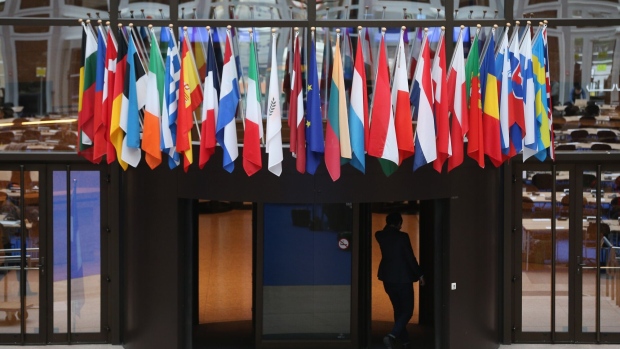May 6, 2024
EU Aims to Sanction Russian Political Cash Before European Vote
, Bloomberg News

(Bloomberg) -- The European Union is proposing to ban political parties, think tanks and other groups from accepting funding from Russia as part of its next round of sanctions aimed at punishing Moscow over its war on Ukraine.
The European Commission, the bloc’s executive body, is recommending that member states agree to the steps as part of its 14th sanctions package, according to people familiar with the discussions.
The measures being discussed include banning the import of Russian helium, tightening export restrictions on manganese ore and other rare-earth components, and prohibiting port access for around 11 shipping vessels suspected of aiding Russia’s war effort, said the people, who requested anonymity to discuss confidential matters.
The proposal, which would also ban four additional media outlets from broadcasting in Europe, needs to be agreed unanimously by the bloc’s 27 member states to enter into force and could still change. Previous packages have required weeks of closed-door negotiations.
European Commission Vice President Vera Jourova said on Sunday that the EU would sanction Voice of Europe, a website accused of spreading pro-Russian disinformation, along with Rossiiskaja Gazeta, Ria Novosti and Izvestia.
“We don’t recognize them as media, they are simply Putin’s propaganda tools,” Jourova told Czech public television.
The push to crack down on Russian political funding into the EU comes amid rising concerns about disinformation pushed by Moscow tied to the European Parliament’s elections in early June. France, along with the Baltic nations, Poland and the Netherlands, had urged the bloc to sanction Russian election interference, Bloomberg reported previously.
Czech intelligence services in March said they had uncovered a Russian network trying to influence politics and public opinion across the continent using Voice of Europe. German far-right lawmaker Petr Bystron has denied taking money from the website, while Belgium in April opened an investigation into political meddling by the Kremlin.
Far Right
The moves could constrain some far-right parties in Europe, given some officials have been accused of receiving Russian financing. France’s far-right National Rally party last year said it paid back €6.1 million ($6.6 million) to close out a loan originally taken from a Russian bank in efforts to distance itself from accusations of foreign influence.
Support for the Alternative for Germany, or AfD, slipped after allegations of links to Chinese intelligence and a pro-Russian media organization.
In addition to the measures on Russian political funding, the EU sanctions are expected to include a ban on the use of the Russian central bank’s Financial Messaging System.
Russia started the Financial Messaging System, its own version of SWIFT, at the end of 2014 following the initial sanctions after the country annexed Crimea from Ukraine. As of January, the system was working with 20 countries, according to Interfax. This includes banks from Belarus, Armenia, Tajikistan and Kazakhstan.
European exporters would also be asked to step up due diligence on their trading practices and could face action if they fail to impede circumvention because of a lack of checks.
In addition, the proposed package includes a swath of sanctions on Belarus for its role in the conflict, including banning imports of navigation technology and luxury goods, exports of crude oil and diamonds, and any transactions that could boost Belorussian industrial capacity.
On energy, Bloomberg previously reported the EU would propose a ban on re-loading and transshipment services for liquefied natural gas from Russia destined for third counties, as well as prohibit servicing Russian LNG projects in the Arctic.
Read More: EU Weighs Sanctions on Russian LNG Projects, Transshipments
The EU has also proposed adding more than dozen companies to an export restrictions list, including several in China, the United Arab Emirates and Turkey, over the alleged role in aiding Moscow circumvent trade sanctions on goods used in weapons or needed to make them.
Another proposal from the bloc’s executive arm is to ban transport companies that are at least 25% Russian-owned from operating in the EU, as well as listing dozens more individuals and entities.
(Updates with additional sanctions measures, including on Belarus, starting in 13th paragraph)
©2024 Bloomberg L.P.








